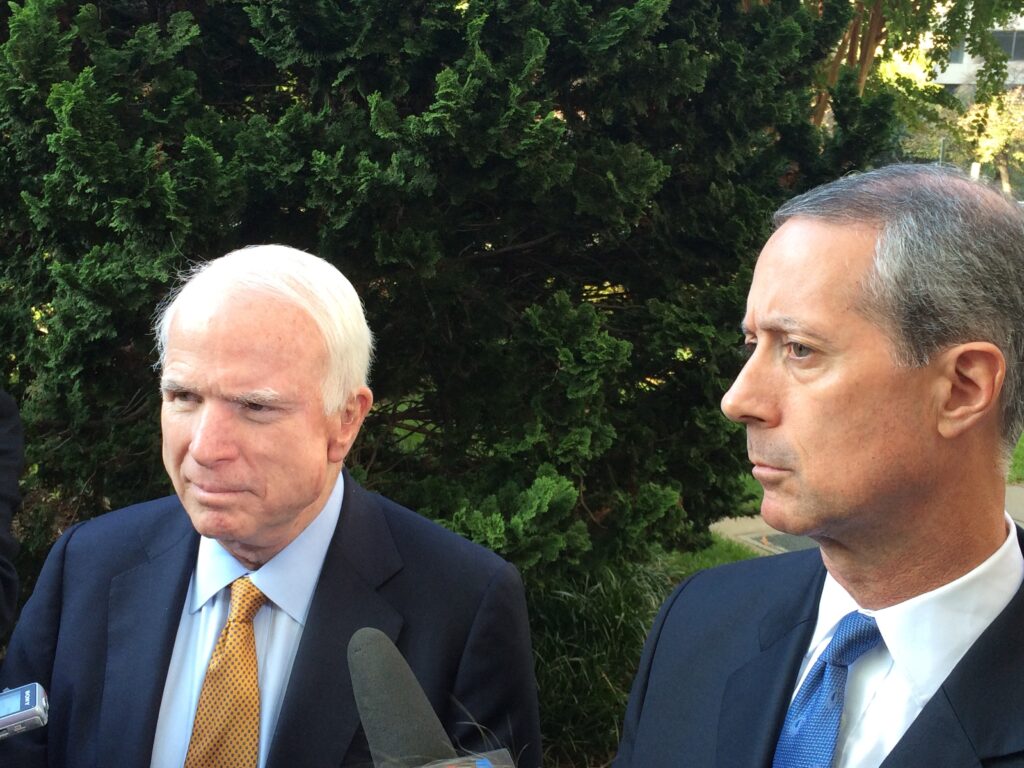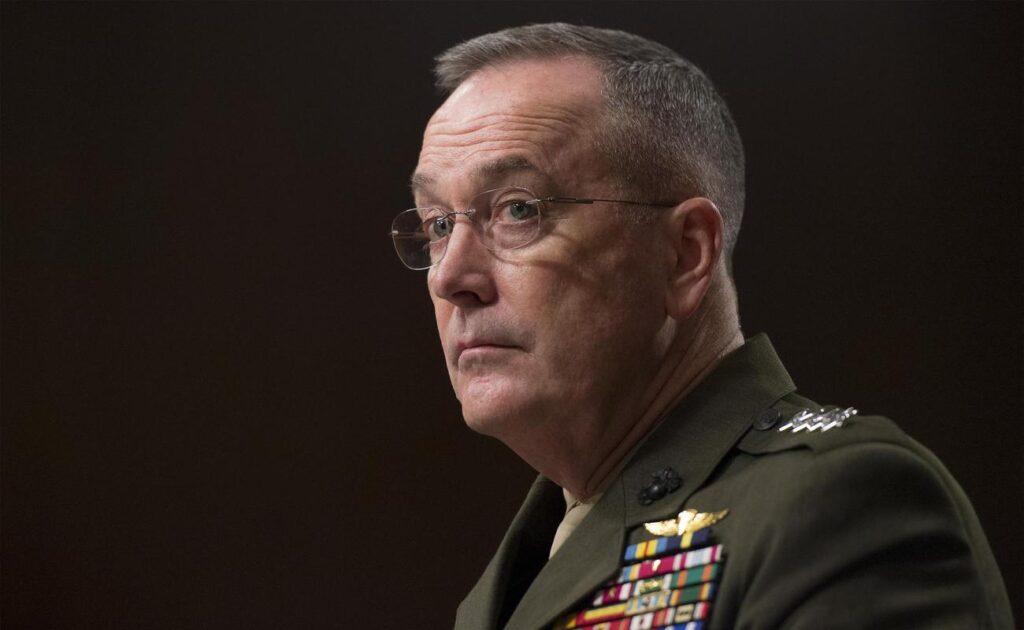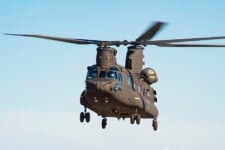
Sen. John McCain and Rep Mac Thornberry
WASHINGTON: As Defense Secretary Jim Mattis prepared to appear before the Senate defense appropriations subcommittee to defend President Trump’s first defense budget, GOP stalwarts Sen. John McCain and Rep. Mac Thornberry were telling reporters it was dead on arrival.
“We’ve got planes that can’t fly, ships that can’t sail and Army units that can’t train,” McCain, chairman of the Senate Armed Services Committee, told reporters at a Defense Writers Group breakfast today, stressing the need for a larger defense budget than Trump has requested (McCain and Thornberry want a $640 billion budget for 2018 while Trump wants $603 billion) and that Congress must pass a regular appropriations bill for 2017 and not rely on a Continuing Resolution as it has for much of the last decade.
The effects of a CR could be grim. “If we have to live under a CR for the rest of the year, all but one deploying Army unit will cease training after July 15, including units scheduled to deploy to Korea and Europe. The Marine Corps will cease all flight operations in July and have to get rid of over 2,000 Marines,” said Thornberry, chair of the House Armed Services Committee. Some will say the services are picking the most sensitive effects of sequestration to fend off any cuts, but this is what they have told Thornberry.
The Army’s vice chief of staff, Gen. Daniel Allyn, told the McAleese/Credit Suisse annual conference this morning that the service will “run out of money in mid-July on the current spend rate, and when that happens all the readiness gains we’ve been building for the last two-and-a-half years are going to start to tip down the precipice.”
Will Congress pass a regular appropriations bill for 2017? The Senate is the key, and McCain told us he “doesn’t know.” But he didn’t sound confident, noting the agenda in the Senate is “crowded” with the so-called replacement for Obamacare as well as the nomination hearings and votes on Supreme Court nominee Neil Gorsuch. Thornberry, clearly trying to send a message to his senatorial colleagues, put the case against a CR bluntly: “This is life and death and has real consequences.” Whether budget hawks and some Democrats will buy that argument remains to be seen.
One of the smartest defense lawmakers, Rep. Adam Smith, told the McAleese/Credit Suisse conference there was a solution, but it’s a nettle the GOP fears to grasp.
“if you feel this strongly about the need to increase the number of ships, the size of the Army, the size of the Marine Corps, how much we pay pilots, the readiness — if you feel that strongly about it, raise the frickin’ taxes to pay for it,” Smith, the top HASC Democrat, said in his inimitable style. Smith also predicted that the 2018 budget would probably top Trump’s request of $603 billion: “My guess is it will go up a little bit, but nowhere near what people are talking about.”
Speaking after Smith, Republican Rep. Rob Wittman also agreed the budget should and would come in higher than Trump’s $603 billion, tho not necessarily at McCain and Thornbery’s $640 billion. But, the chairman of HASC’s seapower subcommittee went on, a lasting solution requires taking on entitlements — which are as much a third rail for the left as taxes are for the right. “The broader budget discussion I do believe does have to address the autopilot spending programs, [not just] the discretionary part of the budget,” Wittman said. “I know the president does not want to address those areas but i believe the House will and has to.”

Gen. Dunford
Military Can Still ‘Defend the Homeland’ — But…
Gen. Joseph Dunford, chairman of the Joint Chiefs of Staff, testified this morning before the SAC-D that the US military still “can defend the Homeland, meet our alliance commitments, and maintain a competitive advantage over any adversary we face. That is an important point that should not be lost on our adversaries, our Allies and partners, or the American people.” But Dunford added that, “sustained operational commitments, budgetary instability, and advances by our adversaries have eroded our competitive advantage.”
McCain hammered away at the readiness problems faced by the military, saying that Air Force pilots are “flying less than their Russian and Chinese counterparts,” which will drive pilots out of the service, worsening an already worrying pilot shortage. If the CR continues, Air Force Vice-Chief of Staff Gen. Stephen W. Wilson, told the McAleese conference this morning, the service would run out of funding for flight hours entirely this summer.
Perhaps Trump’s most consistent military message has been that he will rebuild the Navy and boost the fleet to 350 ships up from the currently planned 308. The question was, with the relatively small number of Navy shipyards and the shrunken defense industrial base, can America boost the fleet efficiently and quickly, Neither lawmaker really answered the question directly, but Thornberry came closest, noting that it takes years just to qualify a welder who works on nuclear submarines,
On another issue, my colleague John Donnelly of CQ/RollCall asked McCain and Thornberry if President Trump faces a credibility problem with allies and the American public. Both Republicans were careful to sideslip the question. The senator, who joked at one point that he and Thornberry “are committed to making America great again,” offered a lukewarm defense of Trump. He “is in the first stages of his presidency, and “the jury is still out.”
Thornberry offered a gentle dig, saying “it’s taken them a bit longer to get their feet under them than most,” because so few Trump campaigners had any government experience. But, Thornberry added wryly, “It’s the actions that count louder than the tweets.” As we all know, though, it’s often the tweets we remember best, not the actions. And that goes for our allies and our enemies, to some extent.
Sullivan: Defense industry ‘still underestimating’ global need for munitions
National Security Advisor Jake Sullivan said that there are “no plans” for another Ukraine supplemental at this point.


























